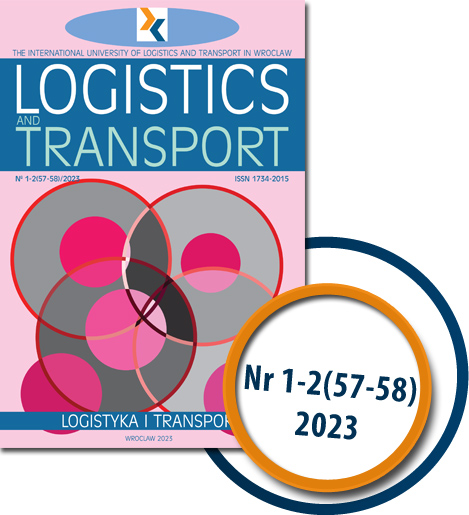
Table of Contents:
1. "THE IMPACT OF CHANGES IN THE EMERGENCY NOTIFICATION SYSTEM ON THE SAFETY MANAGEMENT PROCESS"
Karolina Lis
The article is the analysis of the organization of the emergency notification system in Poland in the context of changes that have occurred in it since the beginning of its operation. First, the structure of emergency notification centres and the role of the operator of emergency numbers are described. Next, the changes introduced by the amendment to the legal acts relating to the emergency notification system were assessed. The scope of changes and their impact on the process of receiving emergency notifications in emergency notification centres are presented.
 |
Download |
2. "Security of ICT Networks for Logistics"
Mariusz Frączek
The overview study contains the most important issues decisive for ensuring the security of logistics ICT networks in the context of contemporary threats, at the same time bearing in mind their military dimension. It highlights the determinants influencing the functioning of the networks used to transmit information. The aspect of the need to ensure the protection of ICT networks dedicated to logistics has not been presented in this approach so far. The author first of all compares economic and hierarchical organizations based on the example of the armed forces. He also referred to the ICT networks of logistics of other uniformed formations.
 |
Download |
3. "The Conditions of Human Behaviour in the Process of Changes"
Zbigniew Ścibiorek
The article deals with various issues related to changes, mainly resistance to them. Basic premises of transformations and doubts that may appear among the organization’s personnel have been discussed. Not only the issues concerning the resistance itself have been included, but also the reasons that determine its intensity and several methods that may be used in practice have been mentioned as well. The study is the result of materials analysis on the aspects of changes determinants and resistance to transformations that are permanently integrated into the functioning of each organization, also strongly hierarchical, which is the army.
 |
Download |
4. "The Innovative Activities Improving Competitiveness of Transport Companies"
Grzegorz Wiśniewski
The article refers to the challenges aimed at identifying decisions that translate into optimization in the TFL industry, on the example of selected activities of transport companies. Awareness of high competitiveness should influence the well-thoughtout directions of development of business owners and managerial staff in the context of creating the company’s distinguishing features. They should be viewed on a global scale in order to increase profit and optimize costs. The article shows a direct connection between optimal patterns of action and the undertaken non-intuitive and innovative activities with the possible development of market niches. The publication draws attention to the multi-threaded and above-standard strategies chosen by selected road transport employers.
 |
Download |
5. "Retrospective Analysis of Ukrainian Air Transport Activity"
Dmytro Bugayko, Anna Antonova, Olga Shevchenko, Dmytro Shevchuk
Ukraine is an aviation state that has a full cycle of development and serial production of aircraft, commercial operation of civil aviation, training and retraining of professionals for the industry. The level of development of air transport determines not only the country's image, but also the sustainable development of its national economy. The article presents a structural analysis of the trends in the development of world aviation transport, as well as the economic development of aviation transport in Ukraine and its infrastructure. The authors pay special attention to the study of the factors of the seasonality of air transportation and their influence on the results of the operational activities of air transport in Ukraine.
 |
Download |
6. "The Key Role of the Dimensions of Supply Chain Management on the Success of the Project Completion Process"
Firas Rifai, Suzan Yousef, Abdelsatar Yousif
From studies, reports, and information, we can see that the Supply Chain Management System (SCMS) has a major impact on project success. The Supply Chain Management (SCM) plays an important role in achieving potential cross-company success because the SCMS allows us to control the development, design, management and identification of the most effective and efficient inputs, information and other resources required to complete the project. An effective SCMS is of essential importance for the strength of the competition and for the success of the entire organization. Therefore, the competitive advantage in this new environment no longer depends on the company’s performance, but also on the entire supply chain partners, including competitors.
 |
Download |
7. "Electrofusion Tensometry Applied to the Research of Engineering Structures"
Zenon Zamiar, Andrzej Surowiecki
The subject of the article concerns the problem of estimating the location of a slip line in a massif with a vertical retaining wall made of reinforced soil, in which the limit state of active pressure was induced. The task is solved experimentally, on the basis of measured unit strains in the reinforcement inserts, with the use of electrofusion strain gauges. The inserts are located in horizontal layers. The slip curve is formed by the points where the maximum normal stresses occur in the reinforcement inserts. This curve cuts off the fragment wedge that is being sought from the plane of the retaining wall. The slip line divides the area of the massif into two zones: active (splinter wedge) and passive, in which the reinforcement inserts are anchored.
 |
Download |
8. "The Quality of Unmanned Aerial Vehicles: Ergodesign Aspect. Part 2"
Volodymyr Kharchenko, Anatolii Rubtsov, Volodymyr Svirko, Irina Zhudova
In the modern world, scientific and practical ergodesign activity on the development and use of drones, the concept of “human factor” is becoming more and more important. It is one of the main studies in improving the safety, efficiency and comfort of the “man - unmanned aerial vehicle” system operation. The most promising research is aimed at the application and development of new approaches to the evaluation of algorithms for unmanned aircraft maintenance and the organization of their operators` activities.
 |
Download |









